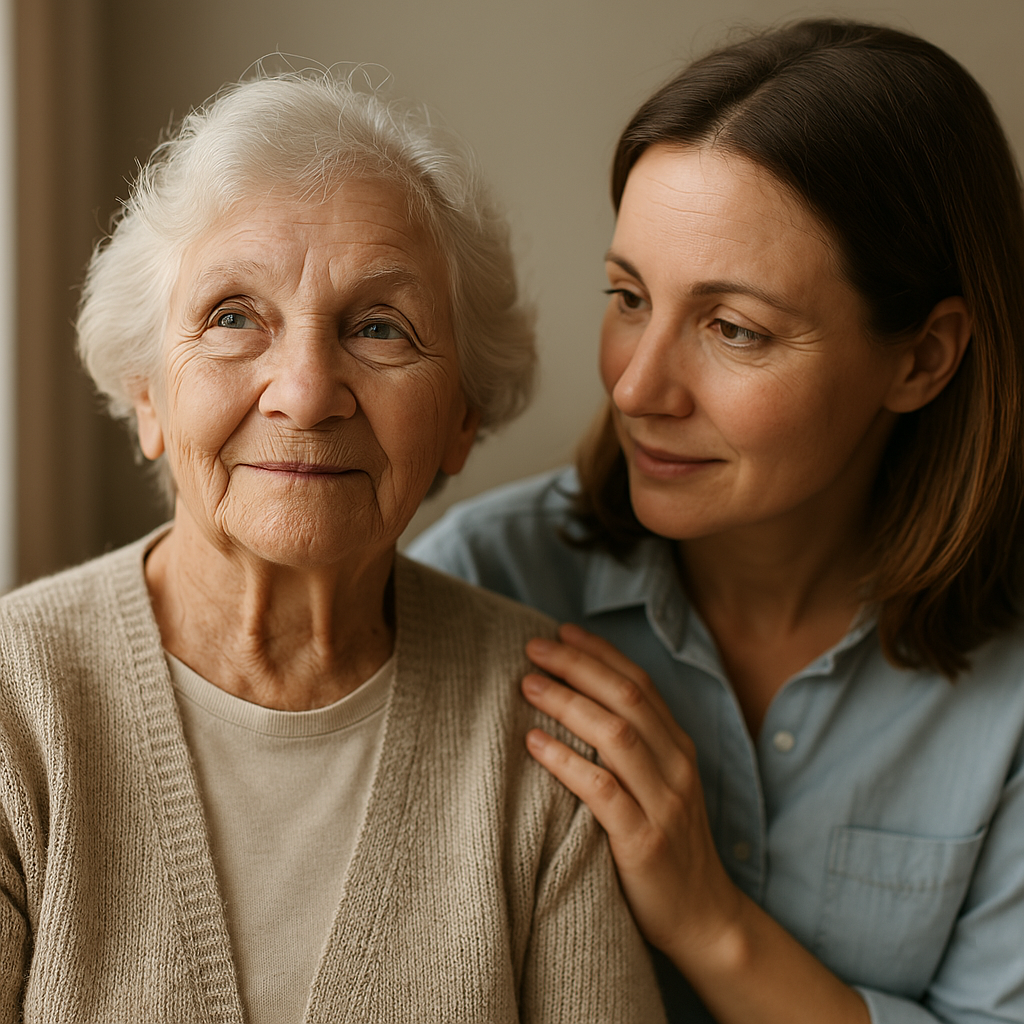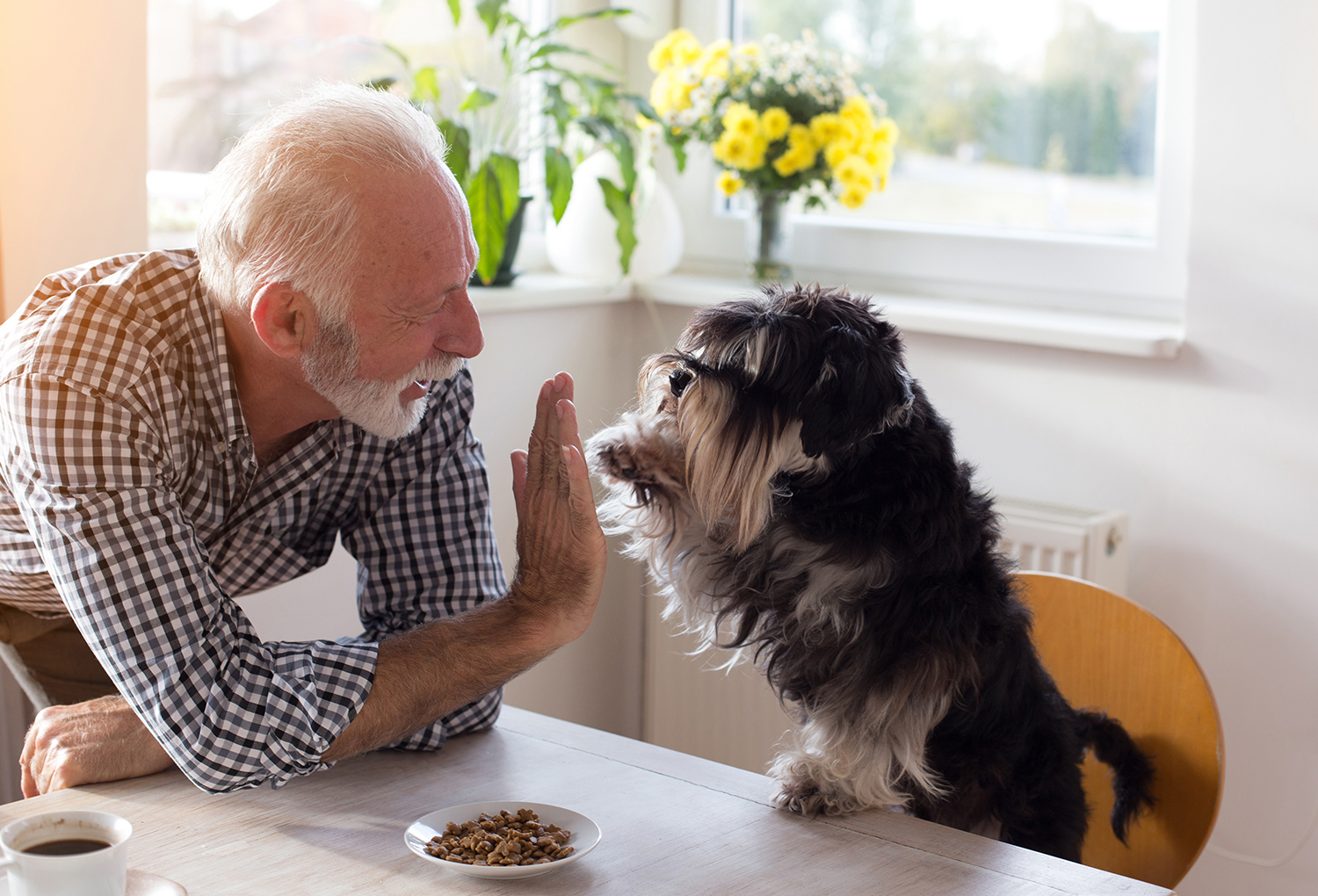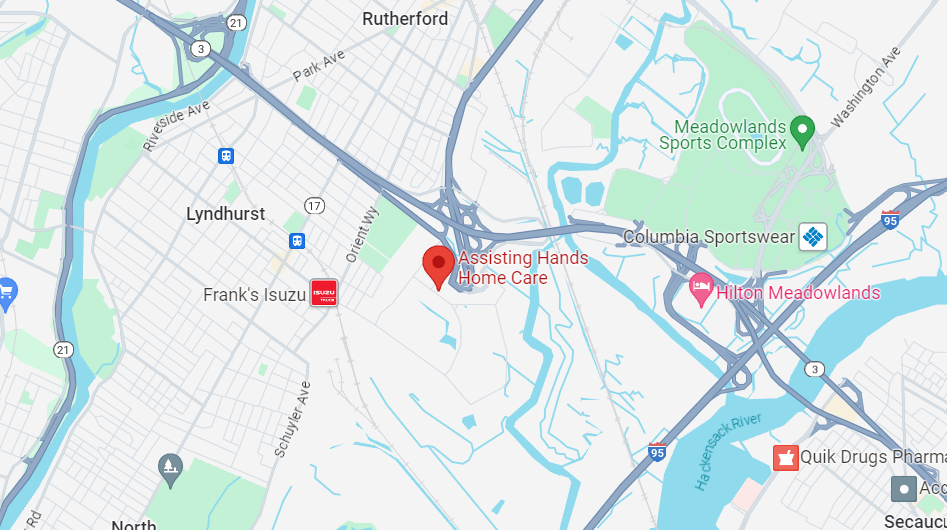According to the CDC, one in four people aged 65 or older fall each year, with slip and fall cases being the leading cause of injury for seniors. When a senior falls, it can be a concerning experience for both the individual and those around them. Prompt and effective response is necessary for ensuring their safety and reducing potential injuries. Knowing the proper steps to take when a senior falls is crucial for caregivers, family members, and even bystanders, to provide assistance and seek medical help. This guide provides necessary information and steps to take to support seniors in vulnerable situations.
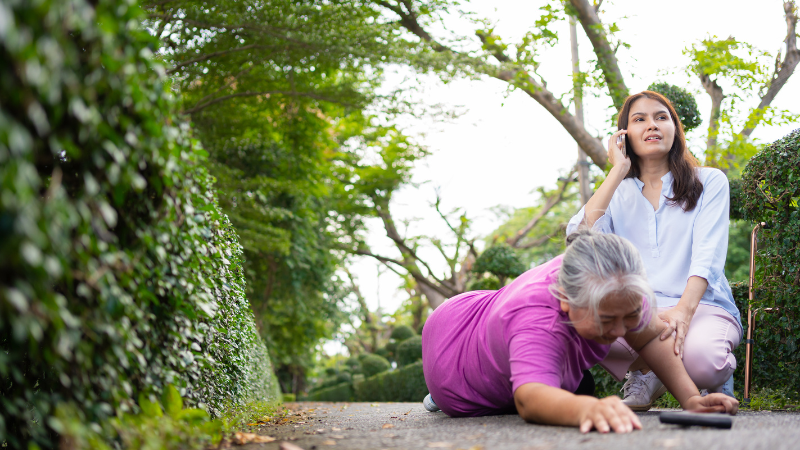
What Causes Falls in Seniors?
Falls in seniors are a major health concern, often resulting in serious injuries, reduced independence, and lower quality of life. Understanding the causes of falls is essential in developing effective prevention strategies. There are various reasons why older adults have a higher risk of falling, including physical, medical, and environmental factors.
Some factors that can contribute to falls in seniors include:
- Muscle Weakness and Balance Issues
- Vision Problems
- Medications
- Chronic Conditions
- Environmental Hazards
- Dehydration and Malnutrition
- Cognitive Impairment
- Foot Problems and Improper Footwear
What to Do When a Senior Falls
IMPORTANT: It is crucial to remember if your loved one has fallen and can’t get up, is bleeding, lethargic, or has injured themselves, you need to call 911 for assistance. It is advised to not try and pick them up yourself to prevent causing additional harm.
When a senior falls, it can be overwhelming and distressing for both the individual and people around. Falls can happen suddenly at any time and require a quick response. While it is important to take precautions to prevent these accidents, it is also valuable to know how to respond.
1. Assess the Situation
During the assessment process, it is important to communicate openly with the senior, providing reassurance and support. Maintain a calm demeaner and start by asking the senior if they are hurt and where they are feeling pain. Take note of any visible injuries like cuts, bruises, or swelling and assess the seriousness of the injuries.
It is important to check on the senior’s mobility and identify any issues that may impact their ability to move safely. If the senior shows no serious injuries and can stand up on their own, help them up carefully to prevent any further harm. If the senior shows signs of confusion, extreme pain, or the inability to get up on their own, it is important to quickly get medical attention.
2. Determine The Cause of The Fall
Examine the surroundings of the senior to identify any potential hazards that could have led to the fall, such as loose rugs, clutter, or slippery surfaces. By recognizing if there are any nearby hazards, you can help the senior stand up safely and prevent any accidents from happening in the future.
3. Help the Senior Get Up
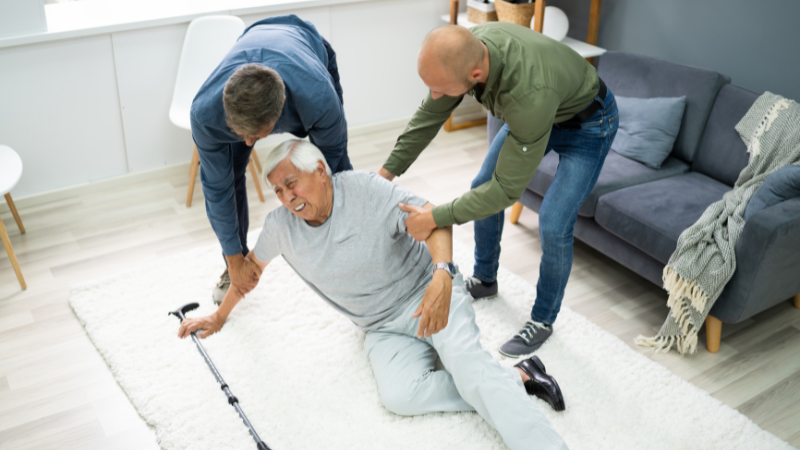
When a senior falls, it is vital for two people to work together to help them stand up. Your role is to assist them in getting back up, rather than doing all the heavy lifting. Attempting to lift someone on your own may only injure yourself and potentially cause the senior more pain, so you must proceed with caution.
To safely assist a senior in getting back up, follow these steps:
- Position a stable chair or other object by the senior’s head.
- Assist the senior in rolling onto their side by gently applying pressure to their hips and shoulders.
- Help them get both hands underneath them.
- Aid the senior in adjusting their position by lifting their hips to get on their hands and knees.
- From here, encourage them to put their arms on the chair, then extend one leg forward so the foot is flat on the floor.
- Now, the senior can use their strength to lift themselves up while you help steady them.
- As needed, help the senior turn their body to sit down in the chair and rest before standing up.
4. Evaluate for 24 Hours
After a senior gets up, they may appear to be in good health. Some seniors may choose not to communicate their pain from an injury to protect their independence, or they may feel embarrassed. In seniors, pain or stiffness may not be felt immediately, sometimes taking a few hours or even overnight to occur.
Caregivers or family members should monitor the senior for approximately 24 hours to ensure their well-being. It is suggested to stay at their home or invite them to stay with you during this period if they are living independently. Alternatively, if they live in a nursing home or assisted living community, there will be staff available to help.
Learn more about Assisting Hands 24 Hour Home Care Services.
5. Go to the Doctor
It is recommended to inform the senior’s primary care doctor or another medical professional about any falls, regardless of their severity. The incident will be documented in their medical records for future reference. If the fall appears to be a significant health concern, you should promptly notify and consult with a doctor.
How Can I Implement Fall Prevention Techniques?
To prevent future falls in your loved one’s home, conduct a thorough safety assessment to identify any tripping hazards such as loose cords or uneven floors. Ensure that the lighting is sufficient for clear visibility while walking. Making small changes to the home environment can prevent falls for seniors by eliminating safety hazards.
Additional safety measures may be necessary for your loved one at home, particularly if they have a history of falls. A fall prevention device – like a cane, walker, or wheelchair – may be recommended by a doctor to assist a senior in moving around safely. You may also consider the installation of grab bars, a ramp, or a stair lift.
If your loved one has a history of falling or has troubles completing daily tasks, it may be beneficial to explore professional 24 hour home care and overnight home care services to make sure your loved one always has someone with them. Elderly caregivers can be utilized at different times of the day, depending on your needs.
Our caregivers at Assisting Hands Home Care are specifically trained in fall prevention through the Fall Prevention Centers of America. Our team is available to evaluate your loved one’s needs and the safety of their home so we can create a care plan that includes fall prevention. Give our compassionate caregivers a call today for a free consultation.

Abhi Mitra founded Assisting Hands Hudson County after recognizing the significant value of personalized and excellent care through family experience, specifically in caring for his grandmother. His expertise in program management, along with a genuine desire to make a positive difference in people’s lives, motivates him to provide the same level of care that his grandmother received. He obtained an MS degree from Pace University, New York, and a Certificate of Executive Healthcare leadership from Cornell University, Ithaka, NY. Abhi efficiently manages tasks with kindness and intelligence, ensuring everyone feels comfortable and welcome. He excels in problem-solving and puzzles while maintaining smooth operations at the agency and ensuring everyone receives high-quality individualized care. His dedication to his work and compassionate nature greatly improves the quality of life for the seniors under his care, providing them with a comfortable and joyful environment. Abhi ensures the highest possible quality, providing reassurance to everyone. His dedication and caring nature contribute to creating a comfortable and joyful environment for those he assists. He enjoys biking, taking walks, and watching cricket with his family and friends.

